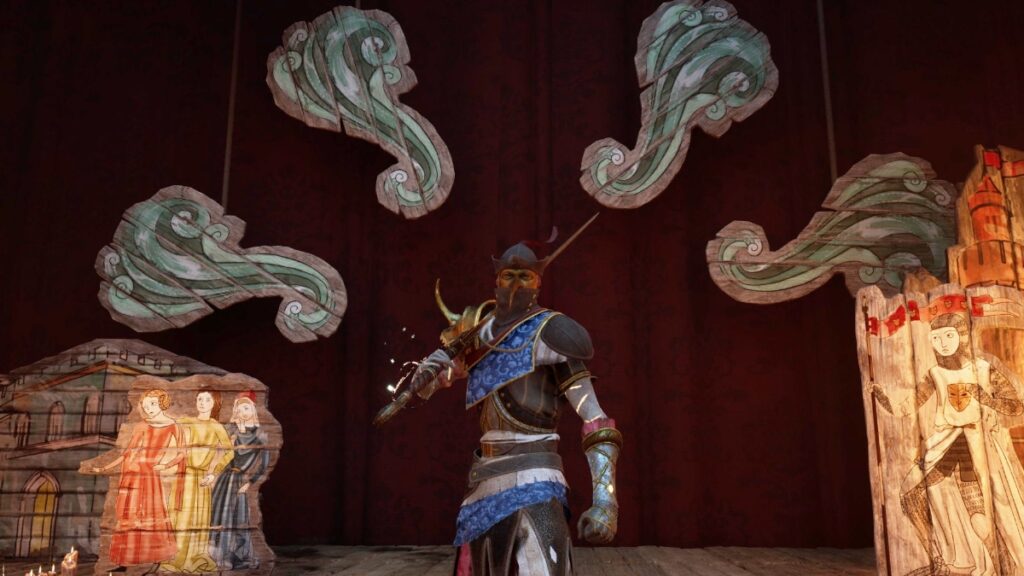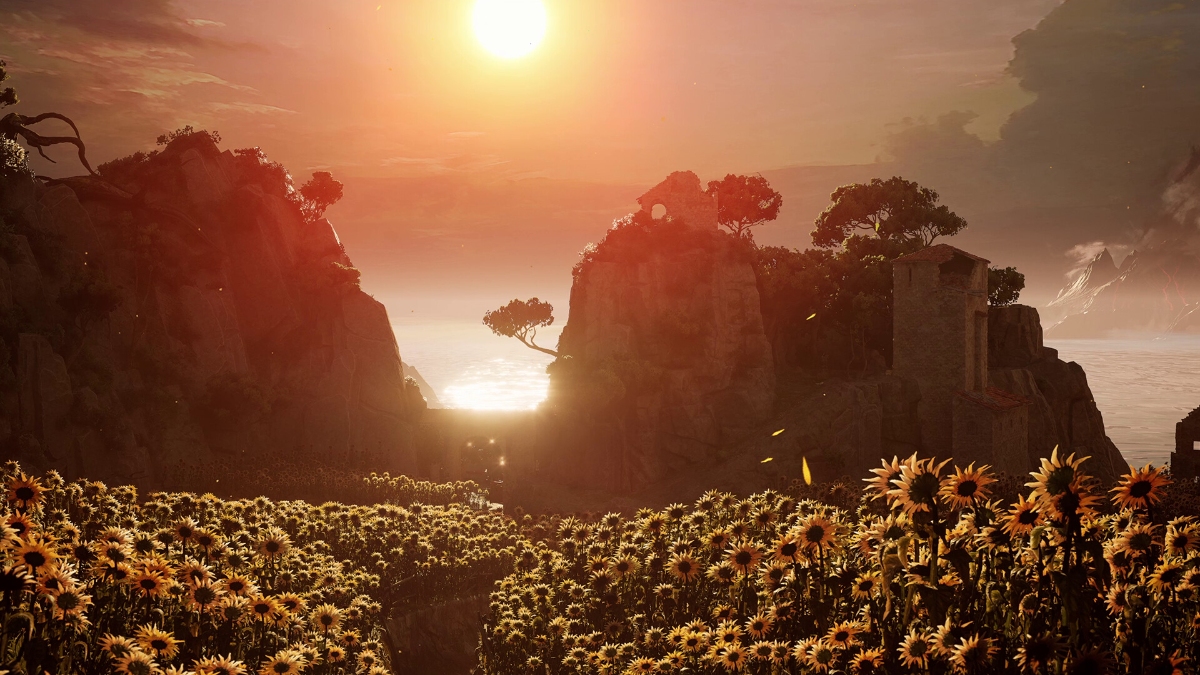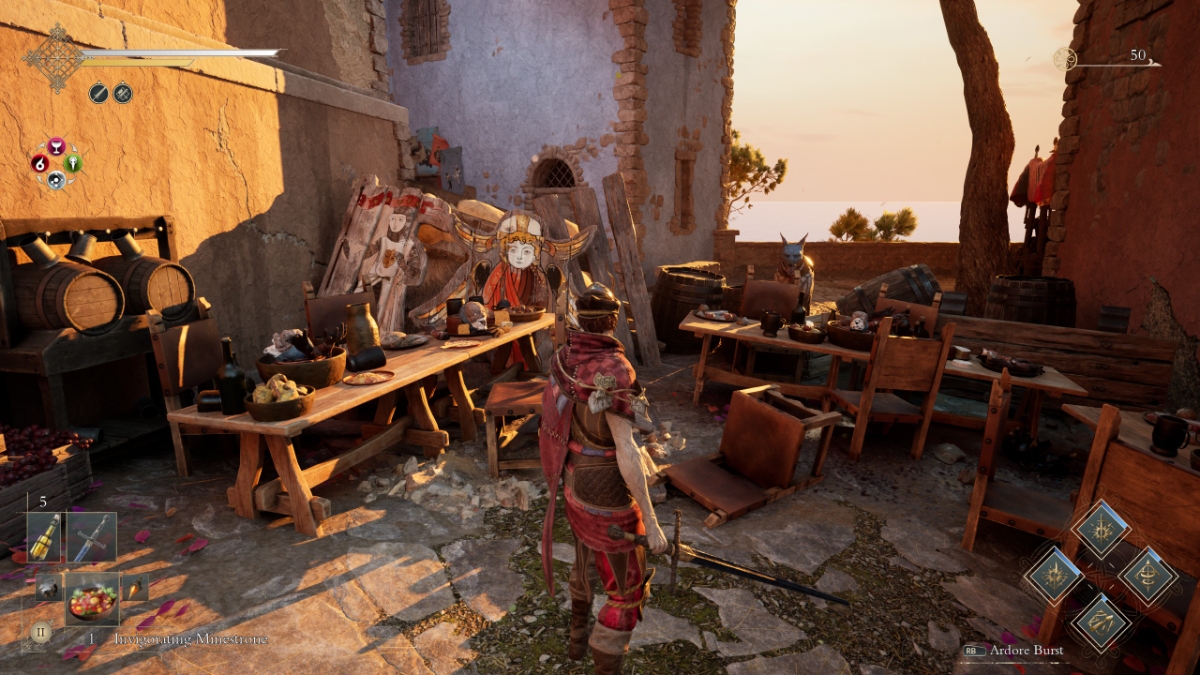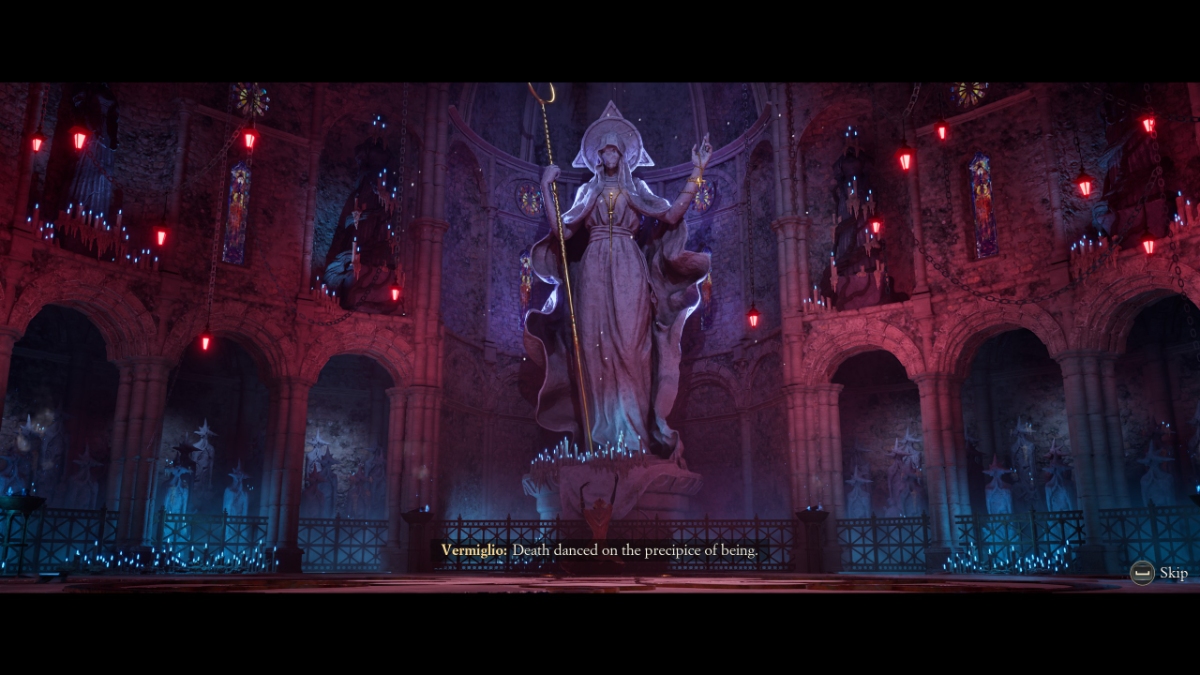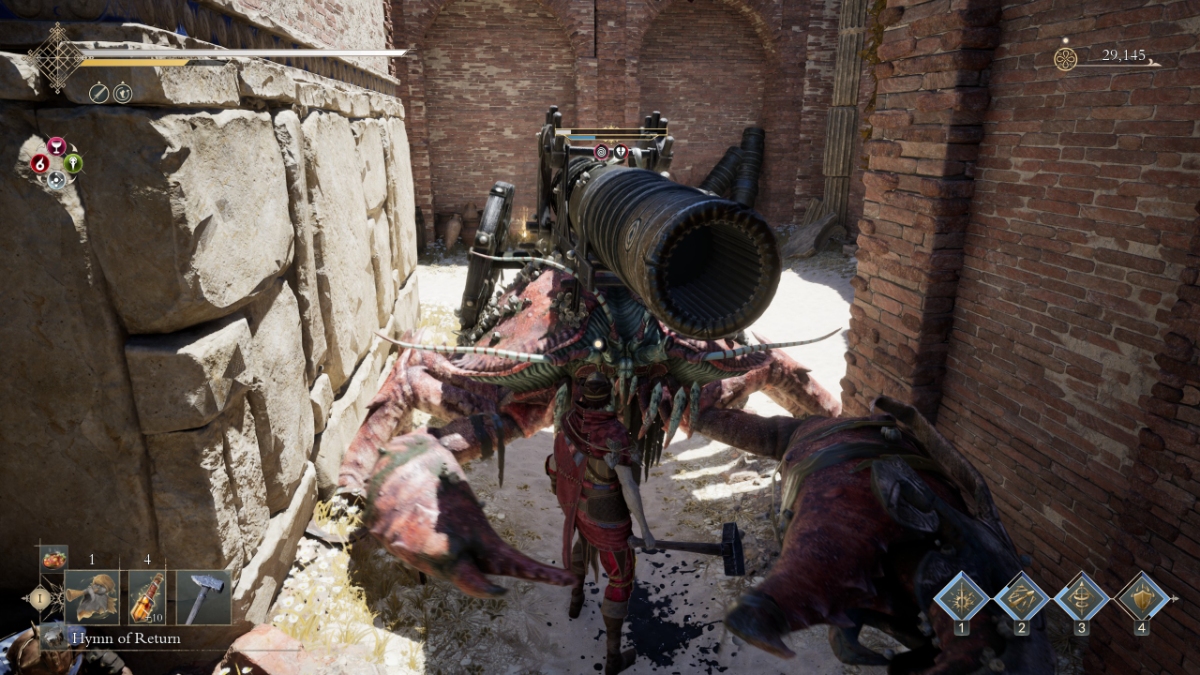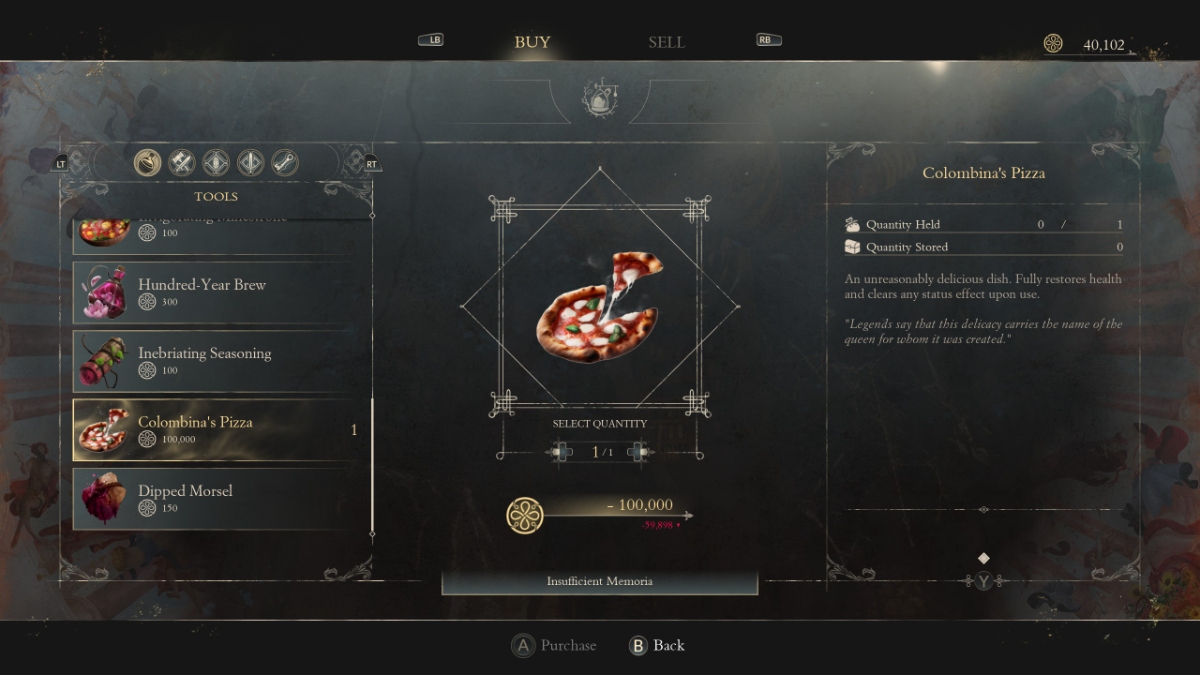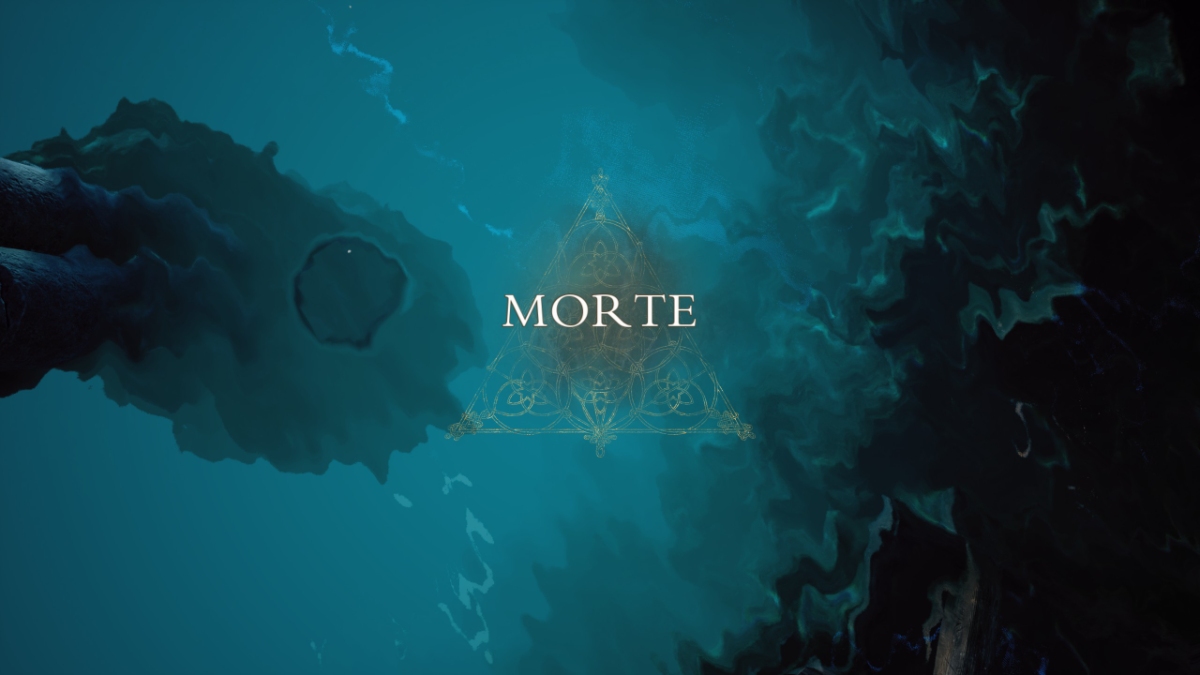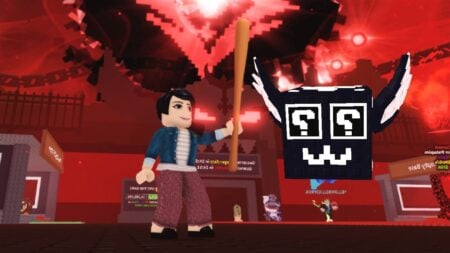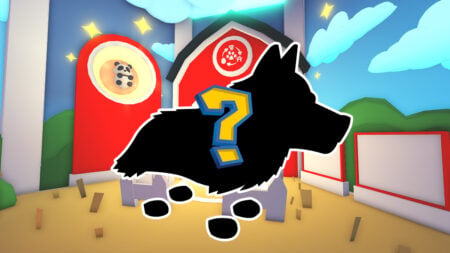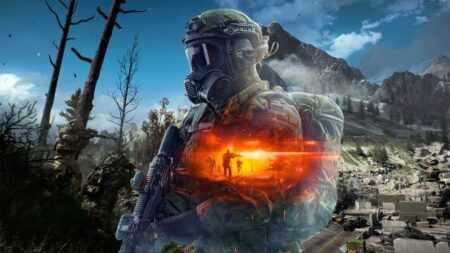Skip To...
Souls-like games have always been in an odd niche. The whole genre is basically several small restaurants trying to copy a Michelin-star recipe, despite knowing that similar-tasting but lower-quality food will usually just make you hunger for the original. From time to time, however, these recipes come up with variances and different spices like new settings or even more gameplay gimmicks. That’s what Enotria: The Last Song sets out to do.
Enotria: The Last Song‘s primary twist in the Souls-like formula is its Italian folklore setting. This new Souls-like flavor’s main course is a bizarre carnival ride sprinkled with theater and acting iconography.
Souls-like Storytelling as Expected
As soon I started the game, I already knew the drill. Having completed the Dark Souls trilogy and finished Elden Ring recently, there was no other avenue apart from regicide or deicide. Enotria does a mysterious albeit standard job of conveying the objectives. These are the bosses, kill them, and become Italy’s Prime Minister. Well, this version of Italy.
The world into which you’re plunged is in ruins and the gods that run the place need to be excised like malignant tumors. All the world’s a stage, except that stage is currently run by drunken fools and power-hungry narcissists. It’s up to you to bring rhythm to the cacophony.
You’re a maskless wooden actor, able to adapt and copy the strengths of other actors in the ruined world. This gives you the edge compared to other beings. It’s another take on the Chosen Undead, but with literally less character customization.
As you can expect, the exposition here is more environmental. You’d be hard-pressed to find meaning behind the imagery unless you read into the semi-hidden text. Often, you’re the one trying to piece things together. Every pamphlet, poster, or room might have something interesting and this lends much to Enotria‘s exploration. The world feels alive and full of secrets.
All the World’s a Stage
Luckily, Enotria makes up for its jumbled plot with scenery and atmosphere you would expect from a game set in the Mediterranean, and in Italy no less. The sun-basked coastal town of Quinta (the first region) is a refreshing take on the Souls-like environment. It’s not difficult to feel amazed by the level of detail that went into maintaining this post-apocalyptic version of a Renaissance fair.
In true Souls-like fashion, everyone is insane and Enotria showcases this atmosphere effortlessly compared to the usual generic grimdark try-hard. I would even go as far as to claim it comes close to Bloodborne with how it portrays its mood, at least during my time in Quinta, the game’s starting region.
Related:
Enotria: The Last Song Dev Reveals How Long It Takes to Beat the Game (New Game Plus Confirmed)Level design is also impressive, though try as it might, Enotria doesn’t have the same flow and connectivity that Dark Souls levels had– a 13-year-old game and the basis for the whole genre.
Still, there are lots of little details that make Quinta immersive and believable, from the rehearsing actors on a figurative burning theater to nihilistic dancing troupes that will attack you on sight. For the first few hours, I was almost convinced that this was a Souls-like that could match its forebears. But fanfare didn’t last when I remembered that this was a video game and not a digital trip to Renaissance Naples.
Difficultissimo for the Sake of It
Where Enotria falls apart is in its mid-stage gameplay. I wasn’t sure whether I liked or disliked what was going on until I got to the second and third regions.
Enotria‘s gameplay involves a parrying system and mostly melee Souls-like combat. There’s a magic system as well, but it’s too limited since it requires a charge-up from your melee attacks and other melee actions. There are no ranged weapons, and there are only seven melee weapon types. So you’re usually left with limited ways to approach combat.
Granted, the game’s mask system adds flavor. You can change builds on the fly (up to three builds) for some flashy combos, but this will require a big investment, and even then, it might perform less spectacularly compared to just parrying everything. For the first six to ten hours, this was fine, but as soon as you leave Quinta, the cracks in the combat system start to show.
After Quinta, enemies become too aggressive, pair up in two or three gank squads, and stagger-lock your character to death. Most attacks will lock your character into a relatively long stagger– even a measly group of crabs will deny you a chance to play the game. Balance gets thrown out the window as getting hit first can sometimes be a death sentence.
The same stagger rules don’t apply to enemies unless you’re wielding a Colossal weapon or performing a strong attack that takes five business days to land. And before the blow connects, you better hope that even a normal-sized enemy doesn’t attack you mid-animation– otherwise, your attack is canceled, you get staggered, and they’ll attack again, locking you in a stagger animation unless you can squeeze in a parry or a dodge.
Only, that’s often difficult to do since you’re locked in a stagger animation. This kind of exchange is not fun, at least by Souls-like standards. That’s where we get into an even deeper fundamental issue with this Souls-like RPG.
Parry This You Filthy Casual
Parrying is more generous in Enotria: The Last Song. You can parry almost all attacks (apart from the obvious AoE slams). Sadly, the game will eventually try to force the playstyle onto you. The problem with that is how the enemies’ stagger meter can become too big later on, requiring you to parry them 10 times or so just to get a clean hit without trading your HP (unless you’re wielding a Longsword).
Some enemies also have weapons that are too thin to see during movement while sometimes the camera becomes erratic while tracking. Other times, indoor areas are too dark to see what’s going on. Not to mention the frame drops and performance issues get in the way of parrying. Even a simple drop from 60 FPS to 50 FPS can put off your parry timing.
Related:
Black Myth Wukong Is a Hit & We Think These Other Mythological Legends Have Massive PotentialYou can dodge, but dodging seems to have no i-frames. The enemy will still hit you unless you’re out of melee range, making dodges often unreliable since most enemy attacks are wide swings. So again, you’re typically stuck with parrying as your main line of defense.
Imposing the parry playstyle wouldn’t have been much of a problem but because of the issues I mentioned above, parrying can often become exhausting. To make matters worse, parrying also consumes your stamina bar. It’s not as thoughtfully done as Sekiro‘s parry system, which was questionable since Enotria stubbornly wants you to parry.
There’s a bloat of artificial difficulty in Enotria that feels like it’s set there to force you into a single playstyle. For a game that considers itself an RPG, that’s quite a detriment.
Why Does Enotria Even Need to be a Souls-like?
The whole parry system is just one of the underlying matters of Enotria that’s also common in other Souls-like titles. Why does this game even need to match Dark Souls or Elden Ring in difficulty? Or why does it try? In fact, why do most Souls-like games do this?
See, what made the hard-but-fair difficulty work in Dark Souls and Elden Ring is FromSoftware’s decades-long experience in making essentially the same game. Few Souls-like games achieve Souls-levels of balance between fun and difficulty. Most of them keep trying to shake up the formula and change what worked so well for FromSoftware– often with clunky results. There are successful outliers like Lies of P— which is a good example of a balance between fun and difficulty.
Enotria, I’m afraid, falls into this trap of thinking it needs to be a Souls-like game. Combat is already too limited or poorly balanced. Additionally, its storytelling was gibbed to fit into the Souls-like mold. In hindsight, Enotria‘s charming fantasy Italy– of which I’m sure its developers are proud, felt wasted on this genre.
Granted, some of the bosses are stellar in Enotria. Some of them justify the existence of the parry system and parry-focused gameplay. Boss voice acting also is superb and boss fights can sometimes transform into epic showdowns and deadly showmanship matches on a grand stage. But again, the game could still be like that even without the Souls-like characteristics.
Prepare for Morte
It’s hard to love Enotria as a Souls-like game. The game stumbles every step in the right direction with many frustrating roadblocks. So if you’re looking for a new Souls-like title to dethrone Lies of P, you’ll have to wait longer for the genre to mature more. Of course, it goes without saying that Enotria holds no candle to FromSoftware games. It might even make you miss Elden Ring or Dark Souls 3.
That isn’t to say Enotria didn’t try to innovate. It did, quite commendably too. The build-switching is a lovely change and a needed Souls-like mechanic. Also, the fun element system can turn fights into puzzles (though it also annoyingly limits gameplay variety). It’s just that Enotria is too clunky in its Souls-like execution and is in need of rebalancing and more polish.
Where Enotria: The Last Song excels is in its presentation. The gorgeous landscape and environment make the trip worth it. Going into a new area is an exciting activity– even if the enemies are too repetitive and even if you know you’ll just be funneled into parrying as you traverse the new horizon.
There’s a beautiful song and a theater play that Enotria wants you to see. You’ll just have to endure some of the questionable parts of its act.
Enotria: The Last Song (PC Reviewed)
Enotria: The Last Song won't steal your love away from stronger Souls-like titles and certainly not from FromSoftware games. But it will turn your head to its bizarre theater. There's no guarantee you will enjoy its act, of course.
The Good
- Beautiful environments
- Immersive voice acting
- Build-switching and element system
- Good art direction
The Bad
- Awkward and floaty animations
- Limited combat variety
- Difficulty spikes and balance issues
- Exhausting parry system

